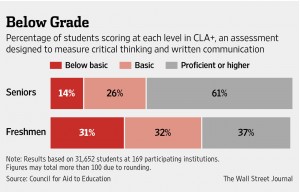A recent study performed by the Council for Aid to Education, reported that fully 40% of four-year-college graduates performed at less than a proficient level in measures of critical thinking. The graph below displays the gloomy results of this survey.

In order to explain why I think this matters, I’d like to tell you a bit about an old friend, Steve, a guy who has worked in the video-production industry for several decades. Steve has never struggled to find or keep a job. Currently he’s riding high for an outfit in Memphis, yet his success has come at least as much from his own positive personality traits as from his education.
He explains that when he went to college, he took a host of technical courses. He learned to edit video by actually cutting up and splicing together tape. Things that we can do with iMovie in just a few moments were grueling tasks in Steve’s early career. A few years into his working years, computers took over the video editing process and most of the skills he had spent so long learning were utterly useless, except as historical curiosities. Steve told me that he wished he had taken more classes in my area. As the two of us sat in front of a video-editing computer, he confessed that his technical skills are temporary while the skills I champion–things like grammar, logic, and rhetoric–are permanent, having been central in education for millennia.
When I was in college, I took the easiest road available to me to complete my required mathematics requirements. Rather than taking a math course above College Algebra, I opted for a computer programming course. Not only is BASIC not a currently used computer language, the entire paradigm of programming has moved away from that style. I’m not going to say that my course in BASIC was an utter waste, but I’m fairly certain I would have learned more about logic and rigorous thinking by going another route.
For too many students, General Education requirements in college are something “to be gotten out of the way” on the way to more important things like accounting or business law or anatomy or educational psychology. Yes, your training as an actuary, a botanist, or a civil engineer might be what will impress people with your resume, but it is your training in the liberal arts, those broad topics that transcend the techniques and technologies of today, that will make you the thinker who can impress people with your performance.

Why the liberal arts in general and English in particular are important. Reason #67
A recent study performed by the Council for Aid to Education, reported that fully 40% of four-year-college graduates performed at less than a proficient level in measures of critical thinking. The graph below displays the gloomy results of this survey.
In order to explain why I think this matters, I’d like to tell you a bit about an old friend, Steve, a guy who has worked in the video-production industry for several decades. Steve has never struggled to find or keep a job. Currently he’s riding high for an outfit in Memphis, yet his success has come at least as much from his own positive personality traits as from his education.
He explains that when he went to college, he took a host of technical courses. He learned to edit video by actually cutting up and splicing together tape. Things that we can do with iMovie in just a few moments were grueling tasks in Steve’s early career. A few years into his working years, computers took over the video editing process and most of the skills he had spent so long learning were utterly useless, except as historical curiosities. Steve told me that he wished he had taken more classes in my area. As the two of us sat in front of a video-editing computer, he confessed that his technical skills are temporary while the skills I champion–things like grammar, logic, and rhetoric–are permanent, having been central in education for millennia.
When I was in college, I took the easiest road available to me to complete my required mathematics requirements. Rather than taking a math course above College Algebra, I opted for a computer programming course. Not only is BASIC not a currently used computer language, the entire paradigm of programming has moved away from that style. I’m not going to say that my course in BASIC was an utter waste, but I’m fairly certain I would have learned more about logic and rigorous thinking by going another route.
For too many students, General Education requirements in college are something “to be gotten out of the way” on the way to more important things like accounting or business law or anatomy or educational psychology. Yes, your training as an actuary, a botanist, or a civil engineer might be what will impress people with your resume, but it is your training in the liberal arts, those broad topics that transcend the techniques and technologies of today, that will make you the thinker who can impress people with your performance.
Share this: